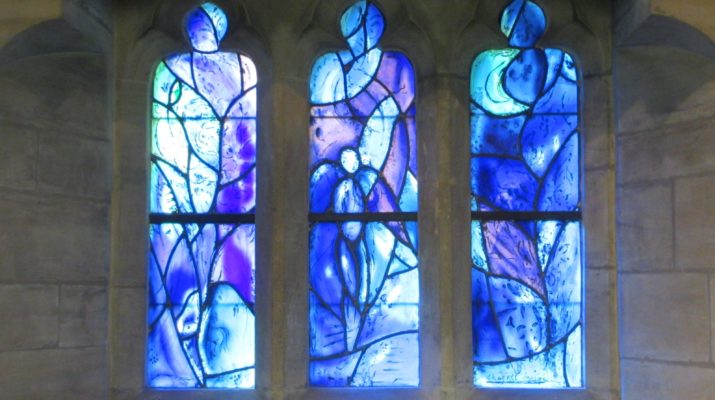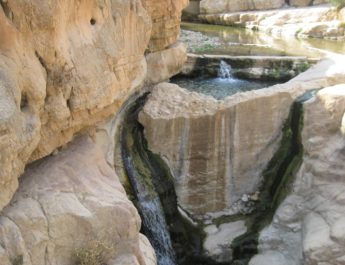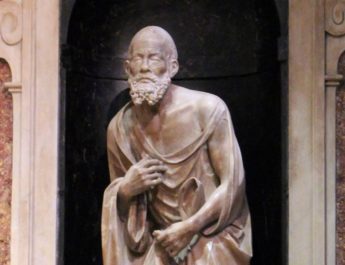Hebrews 12:18-29
Ordinary C39
18 You have not comeA to something that can be touched,B a blazingC fire,D
A “come” = proserchomai. From pros (for, at, towards) + erchomai (to come, go). This is to approach, draw near, come up to. It is also used figuratively to mean worship.
B “touched” = pselaphao. 4x in NT. Probably from psallo (to twang, play, sing psalms, pluck a stringed instrument such as a harp); {from psao (to rub)} + hapha (to handle). This is to touch, feel, or grope about. It is a light touch to explore, discover, or confirm something with physical contact. It can also figuratively mean search for.
C “blazing” = kaio. 11x in NT. This is to kindle, light, blaze. It is light in a literal or figurative sense.
D “fire” = pur. This is fire, lightning, heat from the sun. Figuratively, it can refer to strife or trials.
and darkness,E and gloom,F and a tempest,G
E “darkness” = gnophos. 1x in NT. From dnophos (darkness) OR related to nephos (cloud; figurative for a great crowd or multitude). This is gloom or darkness. It could refer to a thick cloud.
F “gloom” = zophos. Related to “darkness” in v18. 5x in NT. Related to gnophos (see note E above). This is darkness, murkiness, blackness. It can refer to gloom or fist. Figuratively, it can mean apocalyptic or refer to the underworld or despair.
G “tempest” = thuella. 1x in NT. From thuo (to rage or seethe). This is a whirlwind or a storm.
19 and the soundH of a trumpet,I and a voiceJ whose wordsK
H “sound” = echos. 4x in NT. From eche (noise or sound). This is a loud sound, roaring, or echo. It can also be a report, rumor, or fame. This is where the word “echo” comes from.
I “trumpet” = salpigx. 11x in NT. Perhaps from salpizo (to play a trumpet, to sound a trumpet blast literally or figuratively); perhaps from salos (tossing like the waves of the sea; agitation, vibration); perhaps from saino (wag the tail, flatter, beguile, move, shake; figuratively, to disturb); related to seio (to shake, vibrate; figuratively to agitate or show fear). This is a trumpet, bugle, or the sound that a trumpet makes.
J “voice” = phone. Probably from phemi (to declare, say, use contrasts in speaking to shed light on one point of view); {from phao (to shine) or phaino (to bring light, cause to appear, shine, become visible or clear). This is a voice, sound, tone or noise. It can also be a language or dialect.
K “words” = rhema. From rheo (to speak, command, make, say, speak of); from ereo (to all, say, speak of, tell; denotes ongoing speech). This is word, which implies a matter or thing spoken, a command, report, promise, thing, or business. Often used for narration, commands, or disputes.
made the hearersL begM that not another wordN be spokenO to them.
L “hearers” = akouo. This is hear or listen, but it also means to understand by hearing. This is where the word “acoustics” comes from.
M “beg” = paraiteomai. 12x in NT. From para (beside, by, in the presence of) + aiteo (to ask, demand, beg, desire). This is to beg off, refuse, avoid, request.
N “word” = logos. From lego (to speak, tell, mention). This is word, statement, speech, analogy. It is a word that carries an idea or expresses a thought, a saying. It could refer to a person with a message or reasoning laid out in words. By implication, this could be a topic, line of reasoning, or a motive. It can be used for a divine utterance or as Word – Christ.
O “spoken” = prostithemi. 18x in NT. From pros (at, to, toward, with) + tithemi (to put, place, set, fix, establish in a literal or figurative sense; properly, this is placing something in a passive or horizontal position). This is to add, place to, bring together for a reason, or add up.
20 (For they could not endureP the order that was given,Q “If even an animalR touchesS the mountain,T it shall be stoned to death.”U
P “endure” = phero. This is to bear, bring, lead, or make known publicly. It is to carry in a literal or figurative sense.
Q “order…given” = diastello. 8x in NT. From dia (through, across to the other side, thoroughly) + stello (to set, arrange, prepare, provide for); {probably from histemi (to stand, place, set up, establish, stand firm)}. This is to set apart, distinguish, give a commission, order, set apart for service.
R “animal” = therion. From the same as thera (hunting, game, a net, trap, destruction); from ther (wild animal – particularly one that is hunted). This is wild animal or any creature. Figuratively, as wild animals are often dangerous, it can refer to a brutal nature.
S “touches” = thiggano. 3x in NT. Perhaps from thigo (to finger). This is to touch, handle, injure.
T “mountain” = oros. Perhaps from oro (to rise); perhaps akin to airo (raise, take up, lift, remove). This is mountain or hill.
U “stoned to death” = lithoboleo. 7x in NT. From lithos (stone literal of figurative) + ballo (to throw, cast, place, put, drop). This is to stone as in kill by throwing stones at.
21 Indeed, so terrifyingV wasW the sightX
V “terrifying” = phoberos. 3x in NT. From phobeo (to put to flight, terrify, frighten, dread, reverence, to withdraw or avoid; sometimes used in a positive sense to mean the fear of the Lord); from phobos (panic flight, fear, fear being caused, terror, alarm, that which causes fear, reverence, respect); from phebomai (to flee, withdraw, be put to flight). This is fearful, terrifying, or formidable. It is something that causes someone to run away.
W “was” = eimi. This is to be, exist.
X “sight” = phantazo. Related to “voice” in v19. 1x in NT. From phaino (see note J above). This is to make something appear, be visible, be apparent. It is where “phantasm” comes from.
that MosesY said, “ZI trembleAA with fear.”)BB
Y “Moses” = Mouses. From Hebrew Mosheh (Moses); from mashah (to pull out in a literal or figurative sense, to draw out) OR from Egyptian mes or mesu (child, son i.e. child of…). This is Moses – the one drawn out from the water, which is to say, rescued. If derived from the Egyptian, his name would share a root with Rameses and Thutmose.
Z {untranslated} = eimi + kai. Eimi is the same as “was” in v21. See note W above.
AA “tremble” = entromos. 3x in NT. From en (in, on, at, by with) + tromos (trembling, shaking, or quaking from fear); {from tremo (shaking, particularly from fear or dread); from treo (to dread or terrify)}. This is being afraid, shaking because of fear.
BB “fear” = ekphobos. Related to “terrifying” in v21. 2x in NT. From ek (from, from out of) + phobos (see note V above). This is to be earful or horrified. It is scared senseless.
22 But you have come to MountCC ZionDD and to the cityEE of the livingFF God,GG
CC “Mount” = oros. Same as “mountain” in v20. See note T above.
DD “Zion” = Sion. 7x in NT. From Hebrew tsiyyon (Zion – a mountain in Jerusalem as well as another name for Jerusalem itself or the people); related to tsyiyyun (signpost, monument); from tsavah (to charge someone, to command, order); from the same as tsiyyah (dryness drought); from a root meaning parched as desert, dry land. This is Zion – the mountain in Jerusalem, the city, or its people. Also used figuratively to refer to the church.
EE “city” = polis. This is a city or its inhabitants. It is a town of variable size, but one that has walls. This is where “metropolis” and “police” come from.
FF “living” = zao. This is to live literally or figuratively. It is used for life including the vitality of humans, plants, and animals – it is life physical and spiritual and life everlasting.
GG “God” = Theos. From Proto-Indo-European origins, meaning do, put, place. This is God or a god in general.
the heavenlyHH Jerusalem,II and to innumerableJJ angelsKK in festal gathering,LL
HH “heavenly” = epouranios. Related to “mountain” in v20. 19x in NT. From epi (on, upon, what is fitting) + ouranos (air, sky, the atmosphere, heaven; the sky that is visible; the spiritual heaven where God dwells; implies happiness, power, and eternity); {perhaps from oros (see note T above)}. This is heavenly, celestial, high, heavenly one, heavenly thins. It is the heavenly sphere in contrast to the earthly one, the place of spiritual activity. Figuratively, it can mean divine or spiritual. Properly, this describes that which is fitting from heaven’s perspective.
II “Jerusalem” = Ierousalem. From Hebrew Yerushalaim (probably foundation of peace); {from yarah (to throw, shoot, be stunned; to flow as water so figuratively to instruct or teach) + shalam (to make amends, to be complete or sound)}. This is Jerusalem, dwelling of peace.
JJ “innumerable” = murias. 9x in NT. From murios (can mean a large number, countless; in the plural, ten thousand; its root may mean numerous). This is many thousands or a big number that cannot be counted. It is where the word “myriad” comes from.
KK “angels” = aggelos. Probably from ago (to lead, bring, carry, guide) + agele (flock, herd, drove); {also from ago (see above)}. This is angel or messenger. Properly, it is one sent with news or to perform a specific task. This messenger can be human or an angel from heaven. More commonly, it is used for angels in the New Testament.
LL “festal gathering” = paneguris. 1x in NT. From pas (all, every) + agora (assembly, forum, marketplace, town square); {from ageiro (to gather)}. This is a general assembly or a gathering for a celebration. Figuratively, it can mean universal companionship.
23 and to the assemblyMM of the firstbornNN who are enrolledOO in heaven,PP
MM “assembly” = ekklesia. From ek (from, out from) + kaleo to call by name, invite, to name, bid, summon, call aloud) {related to keleuo (to command, order, direct); from kelomai (to urge on)}. This is properly a calling out or an assembly. It was used to refer to a church.
NN “firstborn” = prototokos. 8x in NT. From protos (what is first, which could be the most important, the first in order, the main one, the chief); {from pro (before, first, in front of, earlier)} + tikto (to beget, bring forth, produce). This is firstborn or oldest. Figuratively, it can also mean pre-eminent.
OO “enrolled” = apographo. 4x in NT – 3x in Jesus’s birth narrative in Luke 2. From apo (from, away from) + grapho (to write, describe). This is to register, enroll, write a list.
PP “heaven” = ouranos. Related to “mountain” in v20 & “heavenly” in v22. See note HH above.
and to God the judgeQQ of all,RR and to the spiritsSS
QQ “judge” = krites. 19x in NT. From krino (to judge, decide, think good, condemn, determine, pass judgment, stand trial, sue; judging whether in court or in a private setting; properly, mentally separating or distinguishing an issue – to come to a choice or decision, to judge positively or negatively in seeking what is right or wrong, who is innocent or guilty; can imply trying, condemning, punishing, or avenging). This is judge or ruler.
RR “all” = pas. Related to “festal gathering” in v22. See note LL above.
SS “spirits” = pneuma. From pneo (to blow, breathe, breathe hard). This is wind, breath, or ghost. A breeze or a blast or air, a breath. Figuratively used for a spirit, the human soul or part of us that is rational. It is also used supernaturally for angels, demons, God, and the Holy Spirit. This is where pneumonia comes from.
of the righteousTT made perfect,UU 24 and to Jesus,VV
TT “righteous” = dikaios. From dike (the principle of justice; that which is right in a way that is very clear; a decision or the execution of that decision; originally, this word was for custom or usage; evolved to include the process of law, judicial hearing, execution of sentence, penalty, and even vengeance; more commonly, it refers to what is right); may be from deiknumi (to show, point out, exhibit; figurative for teach, demonstrate, make known). This is correct, righteous, just, or a righteous person. It implies innocent or conforming to God’s standard of justice.
UU “made perfect” = teleioo. From teleios (going through the steps to complete a stage or phase and then moving on to the next one; reaching an end and so being complete or “perfect”; also full grown or mature); from telos (an end, aim, purpose, completion, end goal, consummation, tax). This is finish, accomplish, bring to an end, complete, reach a goal, finish a race, to consummate. It refers to completing stages or phases to get to an ultimate conclusion. It can also mean consecrate or fulfill.
VV “Jesus” = Iesous. From Hebrew Yehoshua (Joshua, the Lord is salvation); {from YHVH (proper name of the God of Israel; the self-existent and eternal one); {from havah (to become) or from hayah (to come to pass, become, be)} + yasha (to deliver, defend, help, preserve, rescue; properly, to be open, wide or free, which implies being safe. So, in a causative sense, this is to free someone)}. This is Jesus or Joshua in Greek – the Lord saves or the Lord is salvation.
the mediatorWW of a newXX covenant,YY
WW “mediator” = mesites. 6x in NT. From mesos (middle, among, center); perhaps from meta (with among, behind, beyond; implies a change following contact or action). This is arbitrator, intermediary, or mediator. This is someone whose function it is (also in the secular sense) to make sure that an agreement or covenant is followed by all parties. So, a mediator restores piece (reconciles) to make sure the covenant succeeds.
XX “new” = neos. This is young, new, fresh, or youthful. This is brand new as opposed to novel (which is kainos in Greek).
YY “covenant” = diatheke. Related to “spoken” in v19. From diatithemi (to place separately – to make a will or covenant; this is arranging ahead of time how things will be accomplished); {from dia (through, because of, across, thoroughly) + tithemi (see note O above)}. This is a will, covenant, contract, or agreement.
and to the sprinkledZZ bloodAAA that speaks a betterBBB word than the blood of Abel.CCC
ZZ “sprinkled” = rhantismos. 2x in NT. From rhantismo (to cleanse; a ritual sprinkling); from rhaino (to sprinkle). This is sprinkling or purification.
AAA “blood” = haima. This is blood in a literal sense as bloodshed. Figuratively, it can also be used to refer to wine or to kinship (being related).
BBB “better” = kreitton. 15x in NT. From the same as kratistos (strongest, noblest – high in dignity or honor; used to speak to a high ranking Roman; can also differentiate an equestrian from a senator); from kratus (strong); from kratos (strength, power, dominion; vigor in a literal or figurative sense; power that is exercised). This is stronger, better, more dominant or nobler. It is better in the sense that it is mastered or developed.
CCC “Abel” = Habel. 4x in NT. From Hebrew Hebel (Abel); perhaps from hebel (emptiness, vapor, breath; something that is fleeting or futile, worthless or a delusion; something that is passing and does not satisfy); related to habal (to be vain, behave in an empty way). This is Abel, meaning “vanity” or “breath.”
25 SeeDDD that you do not refuseEEE the one who is speaking, for if they did not escapeFFF
DDD “see” = blepo. This is literally to see – it is primarily used in the physical sense. However, figuratively it can be seeing, which includes attention and so to watchfulness, being observant, perceiving, and acting on the visual information. It can also mean beware.
EEE “refuse” = paraiteomai. Same as “beg” in v19. See note M above.
FFF “escape” = ekpheugo. 8x in NT. From ek (from, from out of) + pheugo (to run away in a literal or figurative sense; to flee, escape, shun, or vanish). This is to flee away or escape.
when they refused the one who warnedGGG them on earth,HHH how muchIII lessJJJ will we escape if we rejectKKK the one who warns from heaven!
GGG “warned” = chrematizo. 9x in NT– including Matthew 2:12 when the wise men were warned in a dream not to return to Herod. 9x in NT. From chrema (something one uses or needs; money, possessions, wealth); from chraomai (to use, make use of, give what is needed, act in a specific way, request). This is to conduct business, instruct, warn, reveal, to utter an oracle, be warned by God.
HHH “earth” = ge. This is earth, land, soil, region, country, the inhabitants of an area.
III “much” = polus. This is much, often, plenteous – a large number or a great extent.
JJJ “less” = mallon. This is rather, more than, or better.
KKK “reject” = apostrepho. 9x in NT. From apo (from, away from) + strepho (to turn, change, turn back, be converted; to turn around completely to take the opposite path or a completely different one); {from trope (turning, shifting, a revolution; figuratively, a variation); from trepo (to turn)}. This is to turn away from so it could be to leave, to reject, remove, or even desert. It places a focus on one’s personal commitment to this turning back and rejecting.
26 At that time his voice shookLLL the earth, but now he has promised,MMM, NNN
LLL “shook” = saleuo. 15x in NT. From salos (tossing, agitation, rolling – like the sea swells). This is to agitate or shake up. It can mean to disturb, topple, incite, or destroy.
MMM “promised” = epaggellomai. Related to “angels” in v22. 15x in NT. From epi (on, upon, against, what is fitting) + aggello (to announce, report); {(from aggelos (see note KK above)}. This is to proclaim, profess, or make a promise that is fitting.
NNN {untranslated} = lego. Related to “word” in v19. See note N above.
“Yet onceOOO more I will shakePPP not onlyQQQ the earth but also the heaven.”
OOO “once” = hapax. Related to “festal gathering” in v22 & “all” in v23. 14x in NT. From a (with – signifying fellowship) + pag-} OR{from hapas (all; every part working together as a unit); {from hama (at once, together with)} + pas (see note LL above) or from a (with) + pas (see note LL above). This is once, once for all.
PPP “shake” = seio. 5x in NT. This is shake, move, or quake. Properly, it is shaking back and forth. Figuratively, it can mean to agitate or to cause people to have tremors of fear or worry.
QQQ “only” = monon. From monos (alone, single, remaining, mere, desolate); from meno (to stay, abide, wait, endure). This is merely, only, simply, sole. It can also imply alone.
27 This phrase, “Yet once more,” indicatesRRR the removalSSS of what is shakenTTT—that is, createdUUU things—so that what cannot be shakenVVV may remain.WWW
RRR “indicates” = deloo. 7x in NT. From delos (clear, evident, unmistakable, self-evident). This is making something evident, revealing declaring, showing. Often, making clear through words.
SSS “removal” = metathesis. Related to “spoken” in v19 & “covenant” in v24. 3x in NT. From metatithemi (to change, transfer, pervert); {from meta (with, among, behind, beyond) + tithemi (see note O above)}. This is a change, removal, transferal.
TTT “shaken” = saleuo. Same as “shook” in v26. See note LLL above.
UUU “created” = poieo. This is to make, do, act, construct, abide, or cause.
VVV “be shaken” = saleuo. Same as “shook” in v26. See note LLL above.
WWW “remain” = meno. Related to “only” in v26. See note QQQ above.
28 Therefore, since we are receivingXXX a kingdomYYY that cannot be shaken,ZZZ
XXX “receiving” = paralambano. From para (beside, by, in the presence of) + lambano (active acceptance/taking of what is available or what has been offered; emphasizes the choice and action of the individual). This is to receive, take, acknowledge, associate with. It can also mean to take on an office or to learn.
YYY “kingdom” = basileia. From basileus (king, emperor, sovereign); probably from basis (step, hence foot; a pace); from baino (to walk, to go). This is kingdom, rule, authority, sovereignty, royalty, a realm.
ZZZ “cannot be shaken” = asaleutos. Related to “shook” in v26. 2x in NT. From a (not, without) + saleuo (see note LLL above). This is immovable, unshaken, steady.
let us showAAAA gratitude,BBBB by which we may offerCCCC to God an acceptableDDDD worship
AAAA “show” = echo. This is to have, hold, possess.
BBBB “gratitude” = charis. From chairo (to rejoice, be glad; used to say hello; properly, delighting in the grace of God or experiencing God’s favor); from char– (to extend favor, lean towards, be inclined to be favorable towards). This is grace, kindness, favor, gratitude, thanks. It is the sense of being inclined to or favorable towards – leaning towards someone to share some good or benefit. This can be literal, figurative, or spiritual. It is grace as abstract concept, manner, or action.
CCCC “offer” = latreuo. From latris (a hired servant; someone who is qualified to perform a technical task). Properly, this is giving good, technical service because qualified or equipped to do so. It can be serve, minister, worship, or give homage.
DDDD “acceptable” = euarestos. 1x in NT. From euarestos (literally well-pleasing – often used of something that is pleasing or acceptable to God.); {from eu (good, well done, rightly); {from eus (good)} + aresko (to please or be agreeable; implies voluntarily serving others, satisfying others, or making good to win their favor or approval; often used for moral agreement; being agreeable or trying to be agreeable); {perhaps from airo (raise, take up, lift, remove)}}. This is acceptable, pleasing, agreeable.
with reverenceEEEE and awe,FFFF 29 for indeed our God is a consumingGGGG fire.
EEEE “reverence” = eulabeia. Related to “acceptable” and “receiving” in v28. 2x in NT. From eulabes (literally handling well or grasping what is good; cautious or circumspect; by extension, devout, pious, or God fearing); {from eu (see note DDDD) + lambano (see note XXX above)}. This is reverence, pious caution, being dedicated to following God’s call to goodness.
FFFF “awe” = deilos. 4x in NT. From deos (fear, reverence); from deido (to fear). This is fearful, timid, faithless, fear of losing.
GGGG “consuming” = katanalisko. Related to “acceptable” in v28. 1x in NT. From kata (down, against, throughout, among) + analisko (to consume, destroy, or use up); {from ana (up, again, back, among, anew) + halisko (to conquer) OR from ana (see above) + haireomai (to take, choose, or prefer) {probably related to airo (raise, take up, lift, remove)}.}. This is to use up or consume. It is thoroughly consumed, like when fire burns.
Image credit: A stained glass window at All Saints Church in Tudeley, England by Marc Chagall. Photo by H. Harder, 2019.




